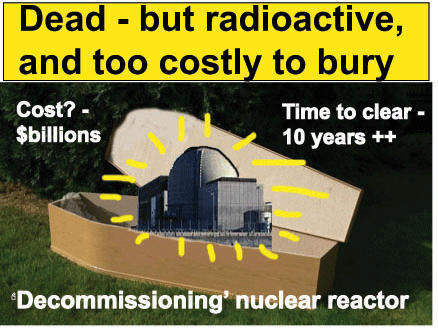One big concern I have with respect to nuclear power is the question of lifespan. Usually, nuclear reactors are licensed for a forty year lifespan. With many existing reactors having been built in the 1970s, their original projected life spans have ended or are ending soon. Nuclear power plants are such a huge investment and generate so much electricity that there is a serious reluctance on the part of energy consumers and power plant owners to retire them when the original license period runs out. These days there is also the problem of climate change and the need for low carbon energy sources such as nuclear power. This results in a push to relicense power reactors for an additional twenty years which has been done frequently. Aside from questions of commercial viability which may result in a request for subsidies from governments, the wisdom of widespread relicensing has been challenged.
Nuclear reactor pressure vessels deteriorate over a forty year lifespan as constant neutron bombardment dislodges atoms for the crystalline matrix of the steel alloy and tiny cracks form which weakens the vessel. Critics of relicensing say that this fact overshadows all other considerations and all old reactors should be shut down and decommissioned after forty years of operation.
Following the Fukushima nuclear disaster in March of 2011, there was a worldwide movement to learn important lessons from the disaster and to apply those lessons to making all existing nuclear power reactors more safe to operate. Many new regulations were passed by various governments and nuclear power reactors were carefully inspected to see what improvements would be necessary to meet the new requirements. In some cases, such as the Ikata nuclear power station in Japan, it was decided that the cost of the required changes to the reactor would be prohibitive and that it made more sense to shut down the reactor permanently.
Another major concern about keeping old power reactors operating for extended life spans has to do with knowledge and expertise. Although there are major designs that are shared among groups of nuclear power reactors, every power reactor is customized to some degree. The longer a particular nuclear power plant has been in operation, the more difficult it is to find engineers who are familiar with the specific details of design and operation of that particular plant. In addition, the older a power plant and the design of its reactors, the more difficult and expensive it is to upgrade that plant to modern standards.
One of the difficulties with decommissioning old nuclear power plants has to do with the cost. In addition, there is the problem of disposing of the spent fuel and current fuel at the plant as well as all of the contaminated materials and equipment. Shutting down and decommissioning nuclear power plants will have a serious impact on electricity supply and regional economics in the area around the plant but in view of the safety problems associated with old nuclear power reactors, decommissioning is a critical necessity and it must be dealt with. Extending the lifespan of an old reactor increases the possibility of serious accidents and just postpones the economic reckoning. With economic difficulties mounting in many parts of the world, if decommissioning is delayed, there may not be sufficient funds to accomplish it and the reactors may be shut down and fenced off. This can result in serious problems about safety and security as time passes.
